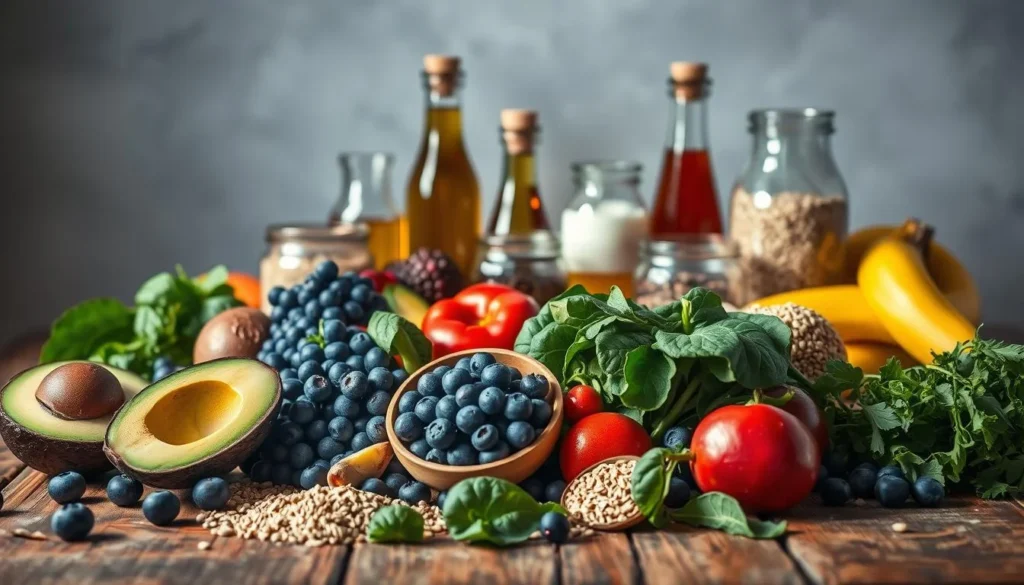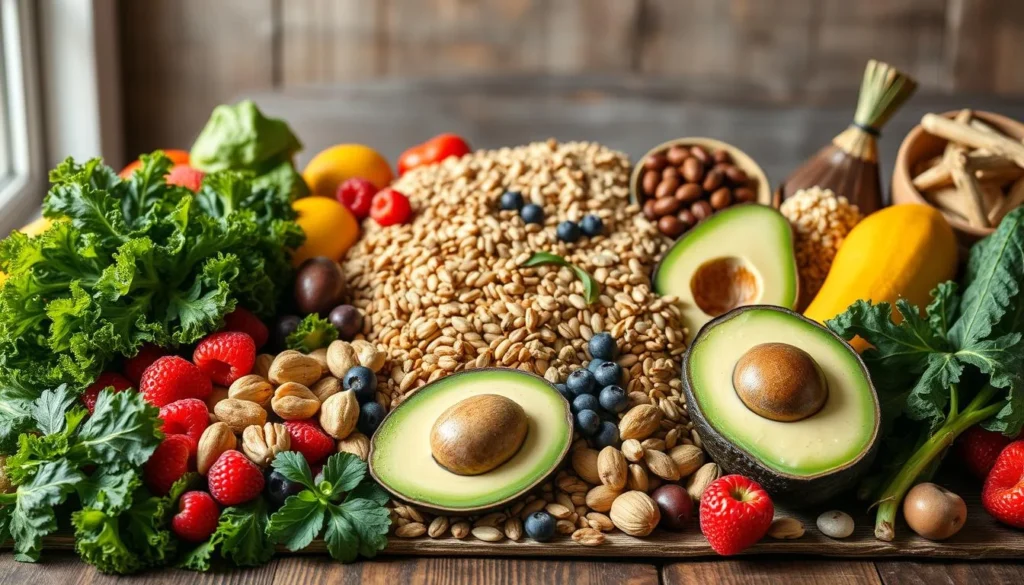introduction
A Few Right Foods Can Change Your Life. They are a nutrient powerhouse. They will stimulate your body to burn more calories and also make you feel very energetic.
And it is more than avoiding harmful foods during this time, its now a healthy foods list as well. It is called adding good food. The first 20 superfoods listed in this article are packed with nutrients. They work to help you get abs and feel better over all.

Key Takeaways
First, Learn the best 20 Superfoods for Weight Loss.
- Understand how nutrient-rich food gives your body a boost.
- Learn how to work these super foods into your day
- Discover the wonders of superfoods and how they contribute to a healthy lifestyle.
- Discover what superfoods can do to enhance your metabolism level and boost energy.
Why Superfoods Are Good for Weight Loss?
They are often praised for weight loss benefits since superfoods contain more nutrients and fewer calories per serving, while actively assisting the metabolism in burning fat efficiently.
Here’s why they help:
1. Good For You, Bad For Calorie Counting
Superfoods or nutrient-dense foods like berries, blueberries, strawberries (and all other fruit), spinach and kale, wholegrains such as quinoa seeds from the chia plantcontain high amounts of vitamins, minerals antioxidants but are low in kilojoules. So you can have it in good measure without overeating.
2. Rich in fibre
Edible fibers like oats, lentils, and flaxseeds that are high in fiber keep you full for a longer time. This reduces cravings and eliminates the urge to snack.
3. Boost metabolism
Some types of superfoods, such as green tea, chili peppers, and even ginger, contain compounds that will help raise your metabolic rate so you burn calories more effectively.
4. Balance blood sugar levels
Aptogenic hormones in superfoods like sweet potato, cinnamon, and beans release the energy at a slower pace, saving you from sudden high spikes followed by an achievable goal. This helps in controlling hunger and preventing fat storage.
5. Support fat burning
Certain superfoods, like avocados and coconut oil, contain healthy fats that help keep you full so your body starts burning its fat stores for energy.
6. Reduce inflammation
Long-term inflammation can prevent you from losing weight. Blueberries, turmeric, and leafy greens are superfoods that have anti-inflammatory components to aid in overall health and weight management.
What Defines a Superfood
Superfoods contain a unique nutrient profile. High in antioxidants, fiber , and healthy fats. They are important for health and weight. We call foods like leafy greens, berries, and nuts “super” because they are super full of good stuff.
Nutrient-Dense Foods and Weight Loss
Real food for fat loss. They provide the proper nutrients for your body without all of the calories. They are also more satiating, so you consume less.
Not to mention, leafy greens and berries — the foods that help you burn fat. They boost your metabolism.
High Metabolism Plant Foods
Plant-Superfoods: Good for the Planet — and You. These foods will enable you to lose with more easily, have higher energy, and great health.
1. Dark, Leafy Greens: Kale, Spinach, and Swiss Chard
Leafy greens are high in nutrients and low in calories —90% is water. BEST FOR FAT LOSS They contain fiber, vitamins, and minerals, which are beneficial for your metabolism.
Quantitative Nutritional Qualities and The Benefits For Weight Loss
These are rich in antioxidants, good fiber. They improve insulin control and promote satiety. They are also high in nutrition, and low on calories.
2. Long red: Blue, strawberry & raspberry
Berries are an excellent source of antioxidants and fiber, with the bonus that they taste great! Blood sugar control and Weight management
Benefits and Blood Sugar Control: Antioxidant Properties
Berries contain antioxidants that help you fight inflammation and stress. It improves your overall metabolic rate. The fiber in them helps slow the absorption of sugar and makes you stay full longer.
3. Avocados: A Source of Healthy Fats that Help You Feel Full Avocado
Healthy fats in avocados will help you feel full and manage your weight. They are also a good source of fiber and many important vitamins and minerals.
4. Broccoli and Cauliflower (Cruciferous Vegetables)
Cruciferous veggies make you a fat-burning machine. They contain antioxidants that help to detox your body and boost metabolism.
5. One of the healthiest complex carbs on the list is sweet potatoes.
Sweet Potatoes – good carbs for long-lasting energy, while boosting your metabolism. They are high in fiber and rich in vitamins.
6. Added Bonus For Apples
Fiber in apples keeps you fuller longer and helps regulate blood sugar. Fiber also helps move things through the intestines.
7. Beans, lentils, and chickpeas
Good For Weight Loss: Legumes are filled with protein and fibre, which makes them good for managing weight. They satisfy your hunger and reduce the desire to snack.
Weight Management – Protein and Fiber Pairing
They have plant protein and on top of that fiber, which is your number one appetite suppressant as well as a thing to keep you regular (up metabolism). That makes them excellent for a fat-loss diet.
Plant-based Superfoods speed up your metabolism and Fat loss. Balanced, whole meals are important.
Healthy Food Options — 20 Best Superfoods for Weight Loss and Better Health
Eat more superfoods to lose weight and be healthy. Raw fruits and vegetables contain all the vitamins. They keep you healthy and make you happy. Top Superfoods for Your Health Goals
8. Wild Salmon: Omega-3 Rich
Omega-3-filled wild-caught salmon. But they are good for your heart and help with weight. Plus omega 3s = Better brain, Less fat! For dinner, you could have grilled salmon or use it in a salad.
9. Greek yogurt: Contains protein; probiotic-rich
Your group is sure to enjoy the protein and probiotics in Greek yogurt. It’s great for losing weight. The protein sticks to your bones, and probiotics are good for the gut. Use unflavored and unsweetened yogurt to make sure no sugar is in it.
10. Eggs: A whole protein for maintaining muscle
Eggs are a complete muscle protein! Another macrovalue is vitamin—e.g., vitamins D and choline, for example. They also assist in strengthening your muscles and help you feel fuller
11. Lean Poultry: Chicken and Turkey
Lean poultry such as chicken + turkey – Great source of protein with little to no fat! These meats have low saturated fat, especially if you strip away the skin. Lean poultry >> Chicken and turkey are good quality sources of protein for muscle growth, repair & satiety. It is also rich in nutrients, such as B vitamins (particularly niacin and vitamin B6), selenium, and phosphorus that are needed for good metabolism, immune system function, and bone health. So instead, toss these babies on the grill, in an oven, or use steam to cook them up.
12. Proteins from plant sources. Foods include: Tofu, Tempeh, and Edamame
For those who do not eat meat, try tofu, tempeh, or edamame. Protein, fiber , and vitamins galore. They work well in stir-fries, salads, and more.
13. Quinoa and Amaranth both come under Ancient Grains
Amaranth and quinoa are superfoods. High in fiber, protein, and minerals, Whole grains are better for you than processed grains.
Health Benefits of Unprocessed Grains and Carbohydrates vs. Consuming Refined Derived Products
Standard grains lose certain nutrients, whilst ancient ones do not. They contain more fiber and protein. Beforehand, it supports your satisfaction and helps you to handle weight. Switch up the white rice for some quinoa, or throw a handful of amaranth into your morning oatmeal.
Consuming these superfoods to help you take care of your weight and health goals. They all contain different items capable of providing your body and hair with fresh benefits.
Superfoods for Health, Vitality, and Weight Loss
Changing your diet to include certain foods can transform you. This is where your essential nutrients come from. It helps keep you healthy and maintain a good weight.
14. Seeds: Chia, Flax, and Hemp
Seeds are small but mighty. They contain omega fatty acids and fiber. So, for example, chia seeds help you to feel full and curb hunger longer.
Omega Fatty Acid Fiber Count
Heart-healthy seeds: flax and chia. There is nothing that can compare to their fiber, assisting with digestion and making us feel full. Skinny Tip: Hemp seeds are delicious as well and also contain protein and fatty acids.

15. Nuts – almonds, walnuts, and pistachios
Nuts are tasty and healthy. At least they are fat-soluble and provide us with defenses. Almonds- Vitamin E, Walnuts for the Brain.
16. Olive Oil, Avocado, and Coconut Oils
Cook with good oils. Olive oil has antioxidants. The best oil for frying is avocado. Coconut oil gives you energy.
17. The Metabolizing Effects of Green Tea and Matcha
Green tea and matcha have metabolism turbochargers. They contain catechins that burn fat and boost your metabolism.
18. Dark Chocolate: Healthy (and Delicious!) Treat
Dark chocolate is delicious and loaded with antioxidants. Ke has decreased inflammation and improved heart health is okay in moderation.
19. Anti-Inflammatory Herbs: Turmeric and Ginger
Turmeric and Ginger -anti-inflammatory Curry powder includes turmeric, which has some nifty curcumin benefits. Digestive and antinauseant properties are in this herb, which is ginger.
20. Kimchi, sauerkraut, and kefir are Fermented Foods.
Instead, probiotics are the ones found in fermented foods. They help your gut health. Gut health is essential not only to weight management but also to overall well-being.
The Healthy Gut and Weight Management Connection
Gut health also has a lot to do with weight. Not to mention, the probiotics in fermented foods regulate appetite and support fat burning. This will help you to lose and maintain the weight off.
When you include these in your diet, they can help improve heart health and weight management.
conclusion
Include superfoods in your daily routine to develop permanent control over weight and improve health. Eating more superfoods helps you to be thinner and happier with the food.
If you want to make your diet balanced, use other superfoods in cooking. Every day, have leafy greens, berries, and avocados. Also, in case you were wondering why the balance of whole foods is so important to your gut health (as I touched upon above), give some wild-caught salmon, Greek yogurt, and ancient grains a spin.
Food is more than just food —it’s a healthy diet. Well, it pertains to both dietary habits, one might say. Watch what you eat and make healthier decisions. This will assist you in reaching your weight goals and being healthier.
Incorporating superfoods into your diet is a healthier step. Loaded with effort and based on the right advice, you should eat these kinds of food items, which means consuming them will increase your health insurance and well-being, in help with body mass sexual intercourse.



Pingback: 10 Essential Facts About White Blood Cells You Need To Know
Pingback: 10 Essential Facts About White Blood Cells You Need To Know
Pingback: The Ultimate Carnivore Diet Meal Plan: Your Guide To Animal-Based Eating